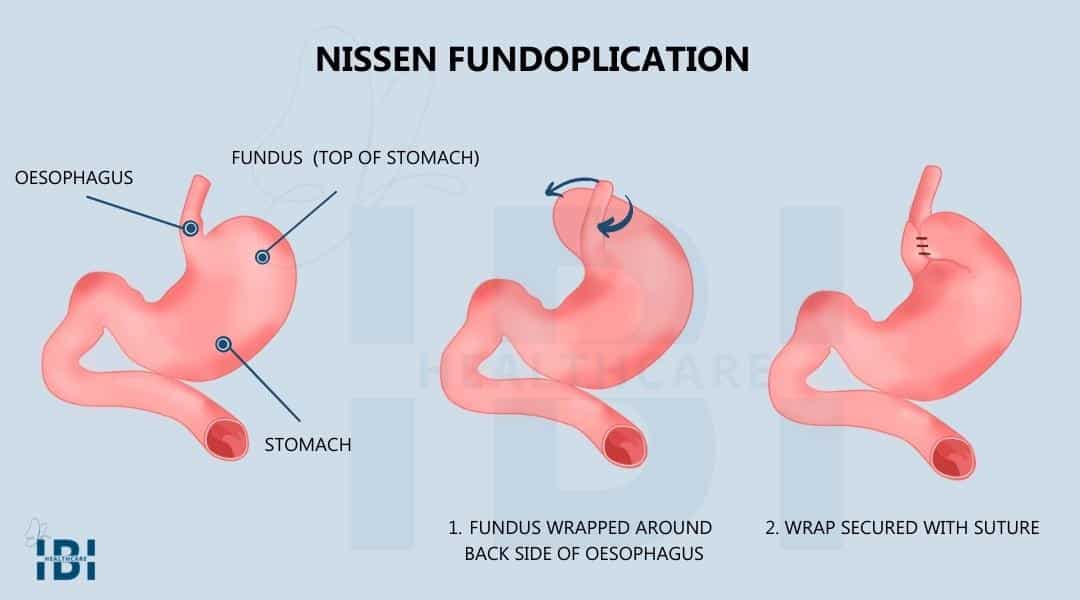Laparoscopic Nissen Fundoplication and Hiatal Hernia Repair
Discover a comprehensive guide to Laparoscopic Nissen Fundoplication and Hiatal Hernia Repair. Furthermore, explore different types of surgery, recovery, and expected outcomes. Are you experiencing frequent heartburn or acid reflux? You are not alone. Over 30% of adults in the US face these challenges weekly.
If you are dealing with chronic acid reflux that doesn’t improve with medication or lifestyle adjustments. Then you may have gastroesophageal reflux disease (GERD). Nonetheless, our advanced surgical interventions effectively address the underlying causes of GERD. For instance a weak esophageal sphincter or a hiatal hernia.
Experience a lasting relief with our anti-reflux procedures. In addition, GERD is normally a symptom of a weak esophageal sphincter, or a hiatal hernia. Eventually, both will require surgical intervention. Although, surgeons perform laparoscopic fundoplication surgery and hiatal hernia repair to address these causes of GERD.
What is GERD?
GERD or Gastroesophageal Reflux Disease is a disorder that causes some acidic stomach juices to travel up into the esophagus. This can cause a burning sensation in the throat, chest, or neck. Eventually leads to damage to the esophagus if left untreated.
What Causes GERD?
GERD can happen occasionally and be temporary or it can be a chronic everyday occurrence. Individuals who experience chronic GERD are usually suffering from issues with their lower esophageal sphincter (LES) or a hiatal hernia.
Lower Esophageal Sphincter (LES)
The food we eat travels from our mouths down into the stomach through a long tube known as the esophagus. At the point where the stomach connects to the esophagus is a small ring-like muscle. The lower esophageal sphincter (LES) precisely opens to let food pass. And then closes to keep the food in the stomach for digestion. When this valve does not work properly and remains open too long or will not close. It allows acid from the stomach to back-flow into the esophagus.
Hiatal Hernia
Another issue that can cause GERD is a hiatal hernia. The diaphragm naturally has a small hole for the top portion of the stomach. Finally, pass through located at the connection point to the esophagus.
However, if this hole stretches enough, it can allow the stomach to migrate upward through the diaphragm. Besides this, shifting even a few centimeters can cause symptoms of GERD.
Hiatal Hernia Repair - GERD Causes
- Obesity.
- Wearing clothing that is too tight.
- Certain medications can cause GERD.
- Overeating resulting a very full stomach.
- Vigorous exercise.
- Eating spicy food.
- Smoking or consuming alcohol.
- Consuming foods with high-fat content.
What Happens if You Chronic GERD Untreated?
EsophagealUlcer
The acid from the stomach can erode the esophageal tissue. And create an open sore causing pain, bleeding, and difficulty swallowing.
Narrowing of the Esophagus
Stomach acid can cause scar tissue to build up and gradually narrow the size of the esophagus. Making it difficult to swallow food.
Increased Risk of Esophageal Cancer
Repeated exposure to harsh stomach acid can cause the cells in the lower esophagus to change. As a result, leads to a condition called “Barrett’s esophagus”. Eventually can become cancerous.
What is the Treatment for Chronic GERD?
When medication and lifestyle changes are ineffective in treating GERD, doctors perform a surgical procedure laparoscopically. Medical professionals consider Laparoscopic Nissen Fundoplication surgery the “Gold Standard” in GERD surgical treatment. Surgeons perform this procedure under general anesthesia to repair the LES valve at the junction of the stomach and esophagus. Often, during the same surgery, the surgeon also performs a hiatal hernia repair. To further reposition the stomach so it does not protrude into the diaphragm.
How do Surgeons Perform Laparoscopic Nissen Fundoplication and Hiatal Hernia Repair?
Indeed, making the necessary repairs to treat GERD often requires two procedures. First to repair the performance of the lower esophageal muscle. Second to repair the hiatal hernia. The typical steps involved are:
- The surgeon will close the incisions.
- The surgeon creates 4 to 5 small incisions in the patient’s abdomen.
- The medical team administers anesthesia to the patient and completes necessary surgery preparation.
- The surgeon will then repair the hiatal hernia and tighten the opening in the diaphragm to prevent the stomach from migrating upward again.
- Then, he will insert a laparoscope through one of the abdominal incisions. This setup provides the surgeon with a “real-time” video feed via a monitor. While performing the surgery.
- Other tiny surgical tools are inserted through the abdominal incisions as needed and used to wrap the upper portion of the stomach around the lower esophagus. Secured with sutures, this will support and tighten the sphincter muscle.

Who is a Candidate for Nissen Fundoplication and Hiatal Hernia Repair Surgery?
In particular, individuals having chronic acid reflux unresponsive to alternative non-invasive treatments. Evidently, consider a candidate for laparoscopic fundoplication and hiatal hernia repair surgery.
Hiatal Hernia Repair Surgery - Benefits
- Shorter hospital stay.
- Excellent results – 95% success rate.
- Laparoscopic surgery carries fewer risks.
- Recovery time is faster.
- Very little pain associated with recovery.
- Performed through only a few small incisions.
Hiatal Hernia Repair Surgery - Associated Risks
Laparoscopic surgery generally carries fewer risks than open surgery. Additionally, associated with less pain and quicker recovery times. However, any surgical procedure carries associated risks. Such as the risk of negative reaction to general anesthesia, bleeding, infection, and injury to internal organs.
Hiatal Hernia Repair Surgery - Cost
The cost of treating GERD with surgery depends on the type of procedure. In addition to the presence of a hiatal hernia, factors such as the extent of necessary repairs. The use of mesh also contributes to the overall cost. To further inquire about the procedure cost visit our Pricing Page.
Heartburn, Acid Reflux, and GERD can cause discomfort from various factors. Here’s a simplified GERD Quiz to identify your GERD Score and Stage.





